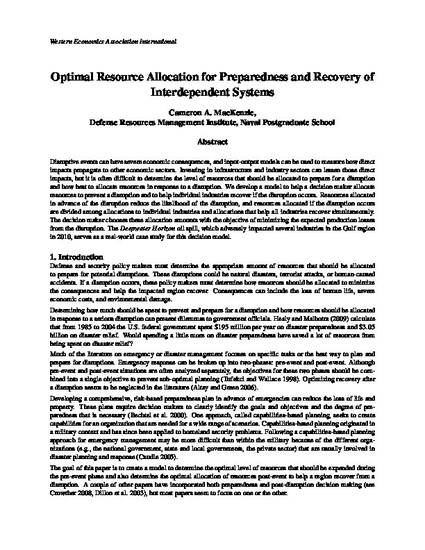
Presentation
Optimal Resource Allocation for Preparedness and Recovery of Interdependent Systems
Proceedings of the Western Economics Association International Annual Conference
(2013)
Abstract
Disruptive events can have severe economic consequences, and input-output models can be used to measure how direct impacts propagate to other economic sectors. Investing in infrastructure and industry sectors can lessen those direct impacts, but it is often difficult to determine the level of resources that should be allocated to prepare for a disruption and how best to allocate resources in response to a disruption. We develop a model to help a decision maker allocate resources to prevent a disruption and to help individual industries recover if the disruption occurs. Resources allocated in advance of the disruption reduce the likelihood of the disruption, and resources allocated if the disruption occurs are divided among allocations to individual industries and allocations that help all industries recover simultaneously. The decision maker chooses these allocation amounts with the objective of minimizing the expected production losses from the disruption. The Deepwater Horizon oil spill, which adversely impacted several industries in the Gulf region in 2010, serves as a real-world case study for this decision model.
Disciplines
Publication Date
June, 2013
Location
Seattle, WA
Comments
Copyright 2013 Cameron A. MacKenzie
Citation Information
Cameron A. MacKenzie. "Optimal Resource Allocation for Preparedness and Recovery of Interdependent Systems" Proceedings of the Western Economics Association International Annual Conference (2013) Available at: http://works.bepress.com/cameron_mackenzie/16/
